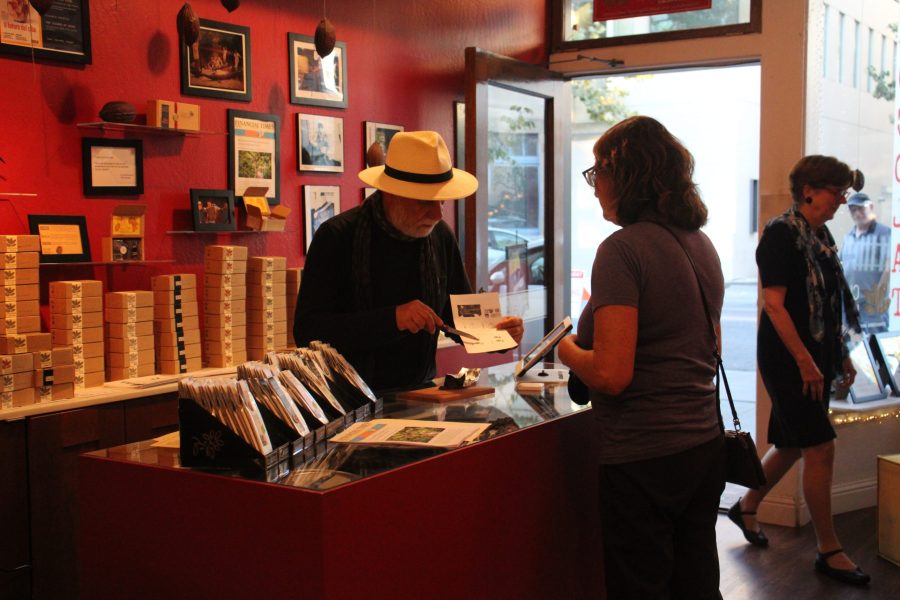Panos Panagos, the owner of Alegio Chocolate, opens his shop in downtown Palo Alto every day at noon. As customers enter, Panagos welcomes them by handing over a menu of his chocolate selections. Then he proceeds to ask his customers a simple question.
“Would you like to try 100% chocolate?”
What Panagos said people do not realize is that the chocolate they are about to taste is some of the purest and most original the world has to offer.
“They’re terrorized before I give them the 100%,” Panagos said. “Most people have it in their mind that dark chocolate might be good, healthy, but bitter. If you taste the 100%, it’s like a triple espresso with no bitterness.”
Panagos said if people have tasted bitter chocolate, the problem is not in the chocolate itself.
“If you happen to get the bitter chocolate, blame the bean,” Panagos said. “We suspect it is the product of genetically modified trees.”
One thing that Panagos said makes his chocolate unique is the cacao trees his company uses, which come from African islands and were the first ones planted in Africa. The trees were rediscovered after being untouched for a century by owner Claudio Corallo’s family.
The trees are also the only ones on the continent that are not genetically modified. Panagos said while many companies enforce unethical practices in producing their chocolate, his customers can count on the fact that Alegio Chocolate is cultivated by people who respect the land and its workers.
Panagos said the Corallo family product is so special because the cacao bean’s distinct genetic code gives the chocolate its own sense of personality and character. Claudio Corallo, founder and creator of Alegio Chocolate, is a Florentine agronomist, a scientist who studies plants, with 40 years of experience in producing coffee and chocolate.
Panagos said Corallo has grown coffee and cacao beans in Africa and Latin America and lives in São Tomé and Príncipe, a small island nation off the west coast of Central Africa, located on the equator in the Gulf of Guinea.
“If you get 100% chocolate from our trees, which we use a minimalistic approach to during the making, a couple of hours later you have 100% which you can go back and manipulate,” Panagos said.
Corallo owns two plantations. Terreiro Velho, on Principe, grows cacao, liberica coffee and pepper. Nova Moca, located on São Tomé, grows coffee. Panagos said Corallo’s chocolate is created by using as few ingredients as possible.
“We don’t use more than three ingredients in the chocolate — cacao, a very minimal amount of sugar, ginger, orange, or salt and pepper.”
Corallo said he cultivates his Fair Trade and labor-free chocolate by hand, using authentic ingredients. Alegio Chocolate takes a sustainable approach to chocolate, all the way from the pruning, or the removing branches, of Forastero Amelonado trees to the grinding of roasted beans.
“We’re completely biodynamic and practice sustainable agriculture,” Panagos said. “We have about 300 families that directly or indirectly benefit from what we do.”
Panagos said Corallo works with small teams of farmers who travel through the rainforests and plantations to examine every cacao tree. Panagos said these farmers bring the chocolate to life.
“At the end of the day, the quality of the chocolate starts from the work on the plantation,” Panagos said.
Panagos has been working for 20 years in the chocolate industry. For Panagos, chocolate is not only about the experience, but the storytelling that comes with it.
“You don’t eat chocolate. You taste chocolate,” Panagos said. “It is the real thing, the real challenge –– it’s just magic.”

